初一下册英语全解
七年级下册英语人教版第一模块讲解
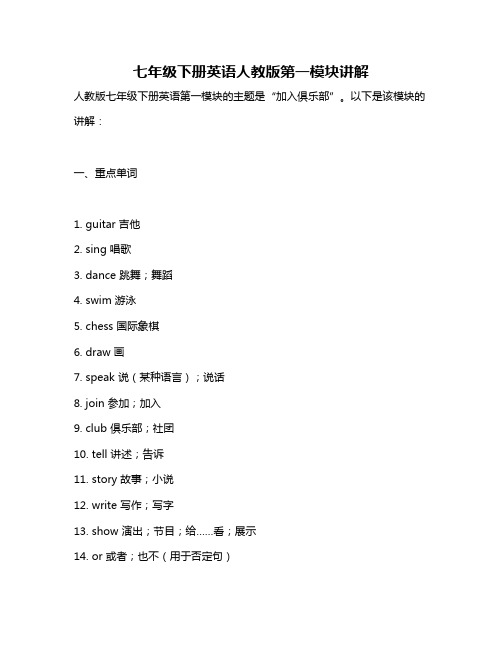
七年级下册英语人教版第一模块讲解人教版七年级下册英语第一模块的主题是“加入俱乐部”。
以下是该模块的讲解:一、重点单词1. guitar 吉他2. sing 唱歌3. dance 跳舞;舞蹈4. swim 游泳5. chess 国际象棋6. draw 画7. speak 说(某种语言);说话8. join 参加;加入9. club 俱乐部;社团10. tell 讲述;告诉11. story 故事;小说12. write 写作;写字13. show 演出;节目;给……看;展示14. or 或者;也不(用于否定句)15. talk 说话;交谈二、重点短语1. play chess 下国际象棋2. speak English 说英语3. be good at… 擅长于……4. help sb. (to) do sth. 帮助某人做某事5. help sb. with sth. 在某方面帮助某人6. It is + adj + (for sb) to do sth. 做某事(对于某人来说)是……的。
7. teach sb. to do sth 教某人做某事。
三、重点句型1. I want to join the art club. 我想加入美术俱乐部。
2. You’re very good at telling stories. 你很擅长讲故事。
3. Can you sing or dance? 你会唱歌或者跳舞吗?4. I want to join the art club. 我想参加艺术俱乐部。
5. What club do you want to join? 你想要参加什么俱乐部?6. You’re very good at tellin g stories, but I also like drawing. 你很擅长讲故事,但我也喜欢画画。
7. It is fun to play the guitar in the club. 在俱乐部里弹吉他很有趣。
(完整版)人教版初中英语七年级下册Unit1SectionB教材全解
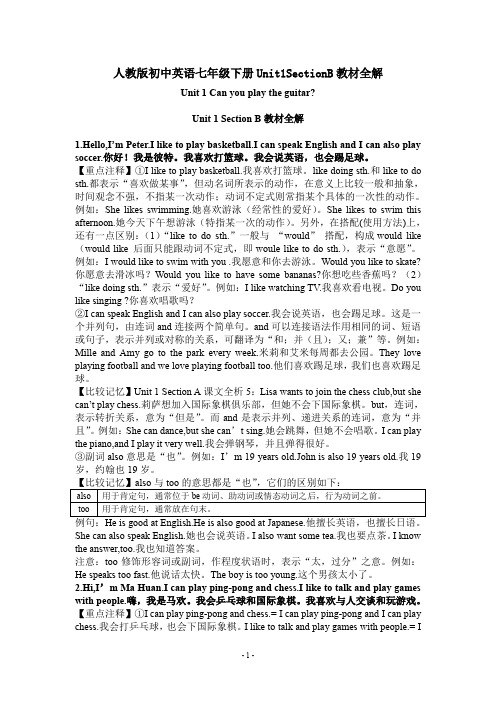
人教版初中英语七年级下册Unit1SectionB教材全解Unit 1 Can you play the guitar?Unit 1 Section B教材全解1.Hello,I’m Peter.I like to play basketball.I can speak English and I can also play soccer.你好!我是彼特。
我喜欢打篮球。
我会说英语,也会踢足球。
【重点注释】①I like to play basketball.我喜欢打篮球。
like doing sth.和like to do sth.都表示“喜欢做某事”,但动名词所表示的动作,在意义上比较一般和抽象,时间观念不强,不指某一次动作;动词不定式则常指某个具体的一次性的动作。
例如:She likes swimming.她喜欢游泳(经常性的爱好)。
She likes to swim this afternoon.她今天下午想游泳(特指某一次的动作)。
另外,在搭配(使用方法)上,还有一点区别:(1)“like to do sth.”一般与“would”搭配,构成would like (would like 后面只能跟动词不定式,即woule like to do sth.),表示“意愿”。
例如:I would like to swim with you .我愿意和你去游泳。
Would you like to skate? 你愿意去滑冰吗?Would you like to have some bananas?你想吃些香蕉吗?(2)“like doing sth.”表示“爱好”。
例如:I like watching TV.我喜欢看电视。
Do you like singing ?你喜欢唱歌吗?②I can speak English and I can also play soccer.我会说英语,也会踢足球。
人教版初中英语七年级下册Unit6SectionB教材全解
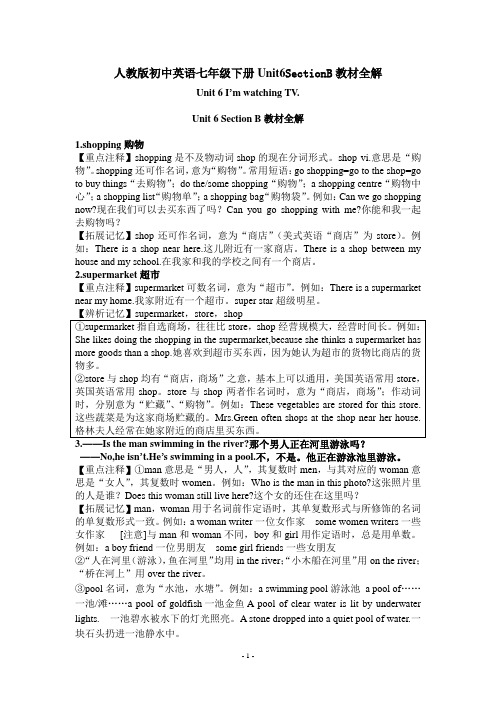
人教版初中英语七年级下册Unit6SectionB教材全解Unit 6 I’m watching TV.Unit 6 Section B教材全解1.shopping购物【重点注释】shopping是不及物动词shop的现在分词形式。
shop vi.意思是“购物”。
shopping还可作名词,意为“购物”。
常用短语:go shopping=go to the shop=go to buy things“去购物”;do the/some shopping“购物”;a shopping centre“购物中心”;a shopping list“购物单”;a shopping bag“购物袋”。
例如:Can we go shopping now?现在我们可以去买东西了吗?Can you go shopping with me?你能和我一起去购物吗?【拓展记忆】shop还可作名词,意为“商店”(美式英语“商店”为store)。
例如:There is a shop near here.这儿附近有一家商店。
There is a shop between my house and my school.在我家和我的学校之间有一个商店。
2.supermarket超市【重点注释】supermarket可数名词,意为“超市”。
例如:There is a supermarket near my home.我家附近有一个超市。
super star超级明星。
——No,he isn’t.He’s swimming in a pool.不,不是。
他正在游泳池里游泳。
【重点注释】①man意思是“男人,人”,其复数时men,与其对应的woman意思是“女人”,其复数时women。
例如:Who is the man in this photo?这张照片里的人是谁?Does this woman still live here?这个女的还住在这里吗?【拓展记忆】man,woman用于名词前作定语时,其单复数形式与所修饰的名词的单复数形式一致。
(完整版)人教版初中英语七年级下册Unit6SectionB教材全解

人教版初中英语七年级下册Unit6SectionB教材全解Unit 6 I’m watching TV.Unit 6 Section B教材全解1.shopping购物【重点注释】shopping是不及物动词shop的现在分词形式。
shop vi.意思是“购物”。
shopping还可作名词,意为“购物”。
常用短语:go shopping=go to the shop=go to buy things“去购物”;do the/some shopping“购物”;a shopping centre“购物中心”;a shopping list“购物单”;a shopping bag“购物袋”。
例如:Can we go shopping now?现在我们可以去买东西了吗?Can you go shopping with me?你能和我一起去购物吗?【拓展记忆】shop还可作名词,意为“商店”(美式英语“商店”为store)。
例如:There is a shop near here.这儿附近有一家商店。
There is a shop between my house and my school.在我家和我的学校之间有一个商店。
2.supermarket超市【重点注释】supermarket可数名词,意为“超市”。
例如:There is a supermarket near my home.我家附近有一个超市。
super star超级明星。
——No,he isn’t.He’s swimming in a pool.不,不是。
他正在游泳池里游泳。
【重点注释】①man意思是“男人,人”,其复数时men,与其对应的woman意思是“女人”,其复数时women。
例如:Who is the man in this photo?这张照片里的人是谁?Does this woman still live here?这个女的还住在这里吗?【拓展记忆】man,woman用于名词前作定语时,其单复数形式与所修饰的名词的单复数形式一致。
人教版初中英语七年级下册Unit6SectionA教材全解

人教版初中英语七年级下册Unit6SectionA教材全解Unit 6 I’m watching TV.Unit 6 Section A教材全解1.watching TV看电视【重点注释】watch TV看电视。
watch a game观看一场比赛。
watch a soccer game 观看一场足球比赛。
[注意]watching TV的watching是现在进行时的v.ing形式,如果写词组“看电视”可以直接表达为watch TV,而不需要说watchingTV;如果在现在进行时的句子中,要表达“正在看电视”,也不是watchingTV,而应该是be(am/is are) watching TV。
(以下出现的动词词组类同,不再赘述)2.cleaning打扫卫生【重点注释】clean此处用作不及物动词,意为“打扫,清理”。
例如:I spent all day cooking and cleaning.我一整天都忙着做饭和打扫卫生。
【拓展记忆】①clean作及物动词,意为“清扫”。
例如:He is cleaning his room.他正在清扫他的房间。
②clean作形容词,意为“干净的”,在句中可作定语、表语或宾语补足语。
例如:The classroom is very clean today.今天教室很干净。
We must keep our classroom clean.我们必须保持我们的教室干净。
③cleaning作名词,意为“打扫,清理”,常构成短语do some/the cleaning,意为“打扫卫生”。
例如:Tom helps his grandfather do some/the cleaning every Sunday.汤姆每星期日都帮爷爷打扫卫生。
④cleaner作名词,意为“清洁工;保洁员”。
例如:His uncle is a cleaner.他叔叔一个清洁工。
3.reading a newspaper读报纸(看报纸)【重点注释】newspaper为可数名词,有单复数形式,它是有news“新闻,消息”(不可数名词)+paper“纸,纸张”(不可数名词)构成的复合词。
最新人教版初中英语七年级下册Unit12SectionB教材全解
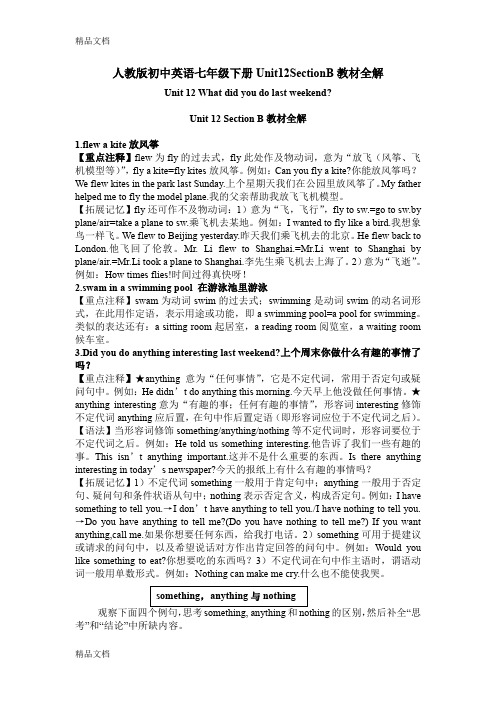
人教版初中英语七年级下册Unit12SectionB教材全解Unit 12 What did you do last weekend?Unit 12 Section B教材全解1.flew a kite放风筝【重点注释】flew为fly的过去式,fly此处作及物动词,意为“放飞(风筝、飞机模型等)”,fly a kite=fly kites放风筝。
例如:Can you fly a kite?你能放风筝吗?We flew kites in the park last Sunday.上个星期天我们在公园里放风筝了。
My father helped me to fly the model plane.我的父亲帮助我放飞飞机模型。
【拓展记忆】fly还可作不及物动词:1)意为“飞,飞行”,fly to sw.=go to sw.by plane/air=take a plane to sw.乘飞机去某地。
例如:I wanted to fly like a bird.我想象鸟一样飞。
We flew to Beijing yesterday.昨天我们乘飞机去的北京。
He flew back to London.他飞回了伦敦。
Mr. Li flew to Shanghai.=Mr.Li went to Shanghai by plane/air.=Mr.Li took a plane to Shanghai.李先生乘飞机去上海了。
2)意为“飞逝”。
例如:How times flies!时间过得真快呀!2.swam in a swimming pool 在游泳池里游泳【重点注释】swam为动词swim的过去式;swimming是动词swim的动名词形式,在此用作定语,表示用途或功能,即a swimming pool=a pool for swimming。
类似的表达还有:a sitting room起居室,a reading room阅览室,a waiting room 候车室。
(完整版)人教版初中英语七年级下册Unit7SectionA教材全解

(完整版)⼈教版初中英语七年级下册Unit7SectionA教材全解⼈教版初中英语七年级下册Unit7SectionA教材全解Unit 7 It’s raining!.Unit 7 Section A教材全解1.raining下⾬【重点注释】rain在这⾥是动词,意为“下⾬”,raining是动词rain的现在分词(v.ing形式)。
例如:It often rains in summer.夏天经常下⾬。
It is raining outside.外⾯正在下⾬。
【拓展记忆】1)rain还可作名词,是不可数名词,意为“⾬;⾬⽔”。
例如:There is a lot of rain here in summer.这⼉夏天⾬⽔很多。
We have too much rain this summer.今年夏天⾬⽔太多了。
2)在表⽰“下⾬”时,可以⽤rain的不同形式来表达。
例如:⊙北京在下⾬——There is rain in Beijing.(rain作名词,表⽰“⾬”)=It is rainy in Beijing.(rain的形容词形式rainy表⽰“下⾬的”)=It is raining in Beijing.(rain的现在分词形式raining表⽰“下⾬”) ⊙明天将要下⾬——It will _____ tomorrow.It will be _____ tomorrow.There will be ____tomorrow.(第⼀空“rain”,will之后加动词原形;第⼆空“rainy”,be是系动词,之后加形容词;第三空“rain”,这⾥rain是名词,不可数名词,意为“有⾬”) 3)⽤heavy (heavily=hard)/light表⽰⾬的⼤/⼩。
例如:∵∵∵There will be a heavy rain tomorrow.明天会下⼤⾬。
It is raining heavily / hard here now。
人教版初中英语七年级下册Unit3SectionB教材全解

人教版初中英语七年级下册Unit3SectionB教材全解Unit 3 How do you get to school?Unit 3 Section B教材全解1.bus stop 公共汽车站【重点注释】stop,此处用作名词,意为“车站;站点”。
例如:at a/the bus stop在公共汽车站。
stop一般指的是小站,停车点,如路边的停车站点;station指的是总站,大型的车站,at a bus/train/subway station。
例如:They wait for Jim at the bus stop.他们在公共汽车站等吉姆。
Where si the bus station?公共汽车站在哪儿?Stop talking,please.请停止(正在)说话(这个事)。
They stop to smoke a cigarette.他们停下来(原来干的事),(然后)抽了根烟。
I must stop smoking.我必须戒烟了(我必须停止正在抽烟这个事)。
2.Mary wants to know where Bob lives.玛丽想知道鲍勃住在哪儿。
Mary wants to know what he thinks of the trip.玛丽想知道他(鲍勃)认为这段旅程怎么样。
【重点注释】①Mary wants to know where Bob lives.玛丽想知道鲍勃住在哪儿。
本句含有一个由连接词where引导的宾语从句。
在复合句中用作宾语的从句叫宾语从句。
无论主句是陈述句还是疑问句,宾语从句都必须使用陈述语序,即“主句+连词+宾语从句(主语+谓语+……)”句式。
如果主句的谓语动词是一般现在时,从句的谓语动词可根据需要,选用相应的任何时态。
例如:Please tell me who knows the answer.请告诉我谁知道答案。
Do you know which class he is in?你知道他在哪个班级吗?I don’t know when he will come back.我不知道他将何时回来。
(完整版)人教版初中英语七年级下册Unit1SectionA教材全解

人教版初中英语七年级下册Unit1SectionA教材全解Unit 1 Can you play the guitar?Unit 1 Section A教材全解1.play chess下国际象棋【重点注释】play后面跟棋牌、球类或其他体育方面的名词时,不加任何冠词。
例如:Can you play chess?你会下棋吗?Let’s go and play soccer.咱们去踢足球吧。
I want to play chess with you.我想和你下国际象棋。
【拓展记忆】动词play的其他用法:①play后面跟乐器时,需要用定冠词the。
例如:I can play the guitar.我会弹吉他。
He likes playing the drum.他喜欢打鼓。
②play后面跟玩具或其他名词时,一般加介词with。
play with…玩……;玩弄……。
例如:Dolphins can play with a ball.海豚会玩球。
Children can’t play with fire.小孩不能玩火。
【试题链接】Bill likes playing basketball,but he doesn’t like playing piano. A.the;the B./;the C.the;/(球类运动前不加冠词;乐器前加定冠词the,故选B)2.speak English说英语【重点注释】①speak的意思是“说话”,作及物动词时,意为“说(某种语言)”,其后的宾语为某种语言。
例如:Does he speak English?他会说英语吗?注意:say it in English意思是“用英语说它”,注意此处不要用speak。
in English “用英语”,如:What’s this in English?Please say it in English.②speak作不及物动词时,意思是“说话”,通常指说话的能力和方式;还可表示“作演讲,发言”之意。
(完整)人教版初中英语七年级下册Unit2SectionA教材全解
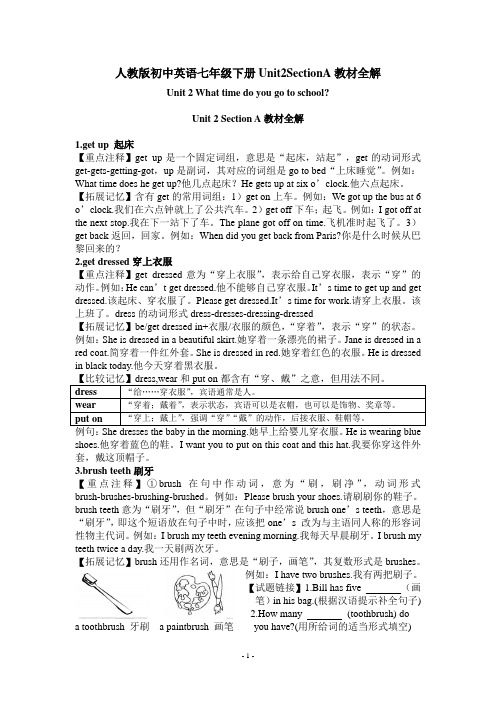
人教版初中英语七年级下册Unit2SectionA教材全解Unit 2 What time do you go to school?Unit 2 Section A教材全解1.get up 起床【重点注释】get up是一个固定词组,意思是“起床,站起”,get的动词形式get-gets-getting-got,up是副词,其对应的词组是go to bed“上床睡觉”。
例如:What time does he get up?他几点起床?He gets up at six o’clock.他六点起床。
【拓展记忆】含有get的常用词组:1)get on上车。
例如:We got up the bus at 6 o’clock.我们在六点钟就上了公共汽车。
2)get off下车;起飞。
例如:I got off at the next stop.我在下一站下了车。
The plane got off on time.飞机准时起飞了。
3)get back返回,回家。
例如:When did you get back from Paris?你是什么时候从巴黎回来的?2.get dressed穿上衣服【重点注释】get dressed意为“穿上衣服”,表示给自己穿衣服,表示“穿”的动作。
例如:He can’t get dressed.他不能够自己穿衣服。
It’s time to get up and get dressed.该起床、穿衣服了。
Please get dressed.It’s time for work.请穿上衣服。
该上班了。
dress的动词形式dress-dresses-dressing-dressed【拓展记忆】be/get dressed in+衣服/衣服的颜色,“穿着”,表示“穿”的状态。
例如:She is dressed in a beautiful skirt.她穿着一条漂亮的裙子。
Jane is dressed in a red coat.简穿着一件红外套。
仁爱版七年级下册Unittopic知识全解图文稿

仁爱版七年级下册U n i t t o p i c知识全解文件管理序列号:[K8UY-K9IO69-O6M243-OL889-F88688]Unit 6 Topic 2 My home is in an apartment building重点单词1、建筑名称:townhouse farmhouse apartment store bankbookstore parking lot supermarket2、道路名词:street railway station road traffic area3、地区名词:Country city countryside community4、动词:rent post close sleep miss move5、名词:month end sport service cost air6、形容词:quiet close colorful noisy freshSection AI 重点短语1 What kind of 什么种类2 A townhouse with two floors 一套两层的排房3.Live with 和…住在一起4.Live in 居住在…5.In the country在农村6.Like doing sth.7.Look for 寻找8.For rent 出租9.room wanted 求租房屋10. A quiet room. 一个安静的房间11. Call sb. At+电话号码打某人的电话。
II 重点知识点1.Wang Wei, what kind of homedo you live in?2.It’s a townhouse with two floors.1)Kind名词“种类,类型”what kind of…“哪种…What kind of sports do you like?2)拓展:a kind of一种 many kinds of许多种, all kinds of 各种各样的。
英语七年级下教材全解

七年级全解下Unit 1 Where’s your pen pal from?live1.vi 生活,居住。
表达居住在某地时,其后常加介词in .Kangaroos live in Australia.2.当作vt 用时,意为“过……样的生活”,其后常加同源宾语(即以与动词同词根的名词做宾语)。
live a happy life3.做adj时,意为“活的,有生命的,活生生的”。
其反义词是dead,一般只用作定语。
☺☺☻☻辨析:live 与 stay两词都有“居住”“停留”之意,1. live 为长期居住,家住某处,后面常接介词in .live 还有“生活”之意。
2. stayHe in Moscow.We on the earth.He at home on Sundays.Mr. Green with her friends.Keys: Lives, live, stays, stayshave vt. 有I have a pen.☺☺☻☻辨析have 与 there be两者都有“有”之意。
have表示某人有某物或某物归某人所有,其第三人称单数为has。
There be表示某处有什么,某物存于某处,是一个倒装句,当主语是单数时用is,时复数时用are。
1. a bag on the desk.2. some apples.3. two maps on the wall.4. a brother.Answers: 1. There is 2. I have 3.There are 4.He hasfavoritefavorite意思是“最喜爱的”。
它的名词有两种形式,一种与其同形,意为“最喜爱的人或物”;一种是favour 意为“好意”“宠爱”“欢心”。
它的动词与名词favor同形,意为“赞成”“喜欢”。
如:He is the favorite of his uncle’s.What is your favorite color?WantWant vt 想,想要,相当于 would like,当主语是第一人称时,用would like 要多于want,因would like语气较委婉。
人教版初中英语七年级下册Unit5SectionB教材全解
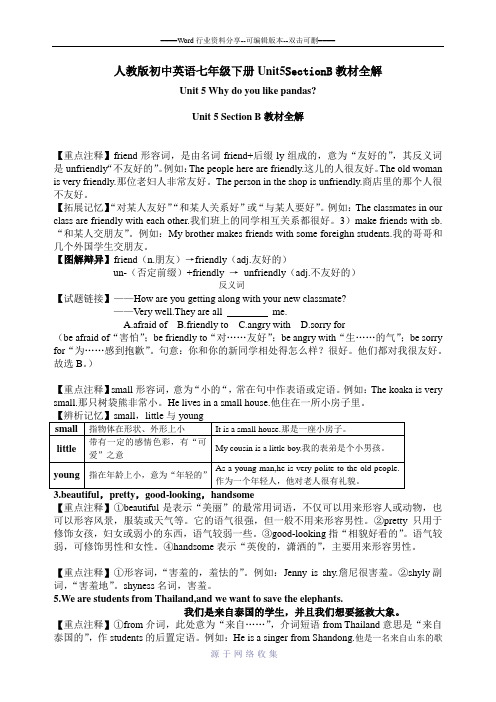
人教版初中英语七年级下册Unit5SectionB教材全解Unit 5 Why do you like pandas?Unit 5 Section B教材全解【重点注释】friend形容词,是由名词friend+后缀ly组成的,意为“友好的”,其反义词是unfriendly“不友好的”。
例如:The people here are friendly.这儿的人很友好。
The old woman is very friendly.那位老妇人非常友好。
The person in the shop is unfriendly.商店里的那个人很不友好。
【拓展记忆】“对某人友好”“和某人关系好”或“与某人要好”。
例如:The classmates in our class are friendly with each other.我们班上的同学相互关系都很好。
3)make friends with sb.“和某人交朋友”。
例如:My brother makes friends with some foreighn students.我的哥哥和几个外国学生交朋友。
【图解辩异】friend(n.朋友)→friendly(adj.友好的)un-(否定前缀)+friendly →unfriendly(adj.不友好的)反义词【试题链接】——How are you getting along with your new classmate?——Very well.They are all me.A.afraid ofB.friendly toC.angry withD.sorry for(be afraid of“害怕”;be friendly to“对……友好”;be angry with“生……的气”;be sorry for“为……感到抱歉”。
句意:你和你的新同学相处得怎么样?很好。
他们都对我很友好。
故选B。
)【重点注释】small形容词,意为“小的“,常在句中作表语或定语。
外研社英语新版七年下册(M1,M2,M3全解)

外研社英语七年级下册MODULE 1 lost and found Unit 1: 1. welcome back to …欢迎返回…;You are welcome.别客气。
别客气。
You are welcomed. 你是被欢迎的。
你是被欢迎的。
2. everyone 不定代词,“每个人”,指、只指人,不指物,不与of 连用。
谓语动词用单三形式。
连用。
谓语动词用单三形式。
every one 即可指人,也可指物,可与介词of 连用。
Every one of us has a chance to speak at the meeting. 3. first of all = firstly = above all 首先; at first 起初起初起初 4. lost and found box “失物招领箱”“失物招领箱”5. there be 句型的时态:句型的时态:一般现在时There is/are There is (some) milk in the fridge. 一般过去时There was/ were There was nothing special about the meal 一般将来时There will be/ is going to be There will be rain next week. 过去将来时There would be/ was going to be There would be/ was going to be Our teacher told us that there would be a test on Monday. Our teacher told us that there would be a test on Monday. 现在完成时There have/has been There has been an increase in the number of road incidents recently. 过去完成时There had been There had been a lot of earthquakes in this area. 6. a lot of/lots of 许多;a lot 相当于very much ,意为“非常”。
(完整)人教版初中英语七年级下册Unit2SectionA教材全解

人教版初中英语七年级下册Unit2SectionA教材全解Unit 2 What time do you go to school?Unit 2 Section A教材全解1.get up 起床【重点注释】get up是一个固定词组,意思是“起床,站起”,get的动词形式get-gets-getting-got,up是副词,其对应的词组是go to bed“上床睡觉”。
例如:What time does he get up?他几点起床?He gets up at six o’clock.他六点起床。
【拓展记忆】含有get的常用词组:1)get on上车。
例如:We got up the bus at 6 o’clock.我们在六点钟就上了公共汽车。
2)get off下车;起飞。
例如:I got off at the next stop.我在下一站下了车。
The plane got off on time.飞机准时起飞了。
3)get back返回,回家。
例如:When did you get back from Paris?你是什么时候从巴黎回来的?2.get dressed穿上衣服【重点注释】get dressed意为“穿上衣服”,表示给自己穿衣服,表示“穿”的动作。
例如:He can’t get dressed.他不能够自己穿衣服。
It’s time to get up and get dressed.该起床、穿衣服了。
Please get dressed.It’s time for work.请穿上衣服。
该上班了。
dress的动词形式dress-dresses-dressing-dressed【拓展记忆】be/get dressed in+衣服/衣服的颜色,“穿着”,表示“穿”的状态。
例如:She is dressed in a beautiful skirt.她穿着一条漂亮的裙子。
Jane is dressed in a red coat.简穿着一件红外套。
七年级下册英语《全解全析》第80页内容
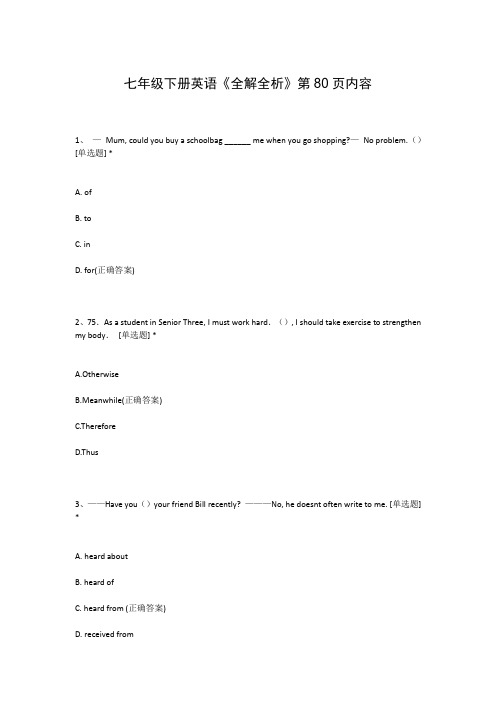
七年级下册英语《全解全析》第80页内容1、—Mum, could you buy a schoolbag ______ me when you go shopping?—No problem.()[单选题] *A. ofB. toC. inD. for(正确答案)2、75.As a student in Senior Three, I must work hard.(), I should take exercise to strengthen my body.[单选题] *A.OtherwiseB.Meanwhile(正确答案)C.ThereforeD.Thus3、——Have you()your friend Bill recently? ———No, he doesnt often write to me. [单选题] *A. heard aboutB. heard ofC. heard from (正确答案)D. received from4、31.A key ring is used __________ holding the keys. [单选题] *A.toB.inC.for (正确答案)D.with5、The museum is _______ in the northeast of Changsha. [单选题] *A. sitB. located(正确答案)C. liesD. stand6、Though the _____ drama is wonderful, I guess most audiences will be tired as it is too long. [单选题] *A. four-hour(正确答案)B. four hoursC. four-hoursD. four-hour's7、—______ my surprise, Zhu Hui won the first prize in the speech contest. —But I think hecould, because he kept practicing speaking.()[单选题] *A. To(正确答案)B. AboutC. ForD. In8、—______? —Half a kilo.()[单选题] *A. How much are theyB. How much is itC. How much would you like(正确答案)D. How many would you like9、People cut down many trees ______ elephants are losing their homes. ()[单选题] *A. ifB. butC. so(正确答案)D. or10、Sometimes Americans are said to be _____. [单选题] *A superficially friendB superficial friendC. superficial friendlyD. superficially friendly(正确答案)11、The market economy is quickly changing people’s idea on_____is accepted. [单选题] *A.what(正确答案)B.whichC.howD.that12、25.A watch is important in our life. It is used for ______ the time. [单选题] *A.telling (正确答案)B.sayingC.speakingD.holding13、—What’s wrong with you, Mike?—I’m really tired because I studied for today’s test ______ midnight last night. ()[单选题] *A. althoughB. unlessC. until(正确答案)D. so that14、3.Shanghai is my hometown. It’s ________ China. [单选题] * A.nearB.far away fromC.to the east ofD.in the east of(正确答案)15、Jane and Tom _______ my friends. [单选题] *A. amB. isC. are(正确答案)D. was16、There are about eight ______ students in my school.()[单选题] *A. hundred(正确答案)B. hundredsC. hundred ofD. hundreds of17、There are many beautiful _______ in the wardrobe. [单选题] *A. bookB. dresses(正确答案)C. cell phoneD. grocery18、67.—What can I do for you?—I'm looking at that dress.It looks nice.May I ________?[单选题] *A.hold it onB.try it on(正确答案)C.take it offD.get it off19、100.The bus can ______ you to the Great Wall. [单选题] *A.leaveB.take(正确答案)C.changeD.spend20、I like booking tickets online,because it is _______. [单选题] *A. boringB. confidentC. convenient(正确答案)D. expensive21、_____ before we leave the day after tomorrow,we should have a wonderful dinner party. [单选题] *A. Had they arrived(正确答案)B. Were they arriveC. Were they arrivingD. Would they arrive22、I used to take ____ long way to take the bus that went by ____ tunnel under the water. [单选题] *A. a, aB. a. theC. a, /(正确答案)D. the, a23、______ the morning of September 8th, many visitors arrived at the train station for a tour.()[单选题] *A. FromB. ToC. InD. On(正确答案)24、75.Why not________ for a walk? [单选题] *A.go out(正确答案)B.to go outC.going outD.goes out25、2.I think Game of Thrones is ________ TV series of the year. [单选题] * A.excitingB.more excitingC.most excitingD.the most exciting (正确答案)26、Tom’s sister is a nurse. I met _______ in the street yesterday . [单选题] *A. sheB. hersC. himD. her(正确答案)27、You can buy some pieces of bread from "_______". [单选题] *A. Bakery(正确答案)B. Travel AgencyC. LaundryD. Ticket Office28、_______ clever boy he is! [单选题] *A. What a(正确答案)B. WhatC. HowD. How a29、74.No person ()carry a mobile phone into the examination room during the national college Entrance Examinations.[单选题] *A.shall(正确答案)B.mustC.canD.need30、I repeated my question several times. [单选题] *A. 到达B. 惊奇C. 重复(正确答案)D. 返回。
英语全解七年级下册25经典范文25页
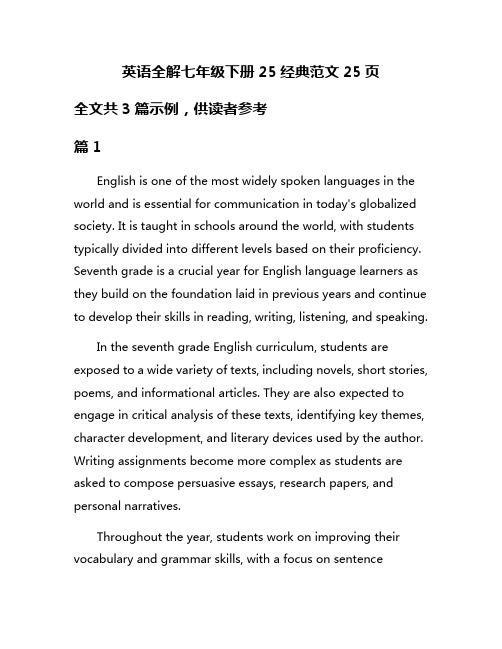
英语全解七年级下册25经典范文25页全文共3篇示例,供读者参考篇1English is one of the most widely spoken languages in the world and is essential for communication in today's globalized society. It is taught in schools around the world, with students typically divided into different levels based on their proficiency. Seventh grade is a crucial year for English language learners as they build on the foundation laid in previous years and continue to develop their skills in reading, writing, listening, and speaking.In the seventh grade English curriculum, students are exposed to a wide variety of texts, including novels, short stories, poems, and informational articles. They are also expected to engage in critical analysis of these texts, identifying key themes, character development, and literary devices used by the author. Writing assignments become more complex as students are asked to compose persuasive essays, research papers, and personal narratives.Throughout the year, students work on improving their vocabulary and grammar skills, with a focus on sentencestructure, punctuation, and word choice. They are also encouraged to practice their speaking skills through classroom discussions, presentations, and group projects. By the end of the year, seventh graders should be able to communicate effectively in English, both verbally and in writing.One of the highlights of the seventh grade English curriculum is the study of classic literature. Students may read works by authors such as William Shakespeare, Charles Dickens, and Harper Lee, providing them with a deeper understanding of literary traditions and cultural values. These texts also serve as a springboard for discussions on important themes such as friendship, love, sacrifice, and justice.In addition to literary analysis, seventh graders also learn about the conventions of different types of writing, such as argumentative, narrative, and expository. They practice writing in these genres, honing their skills in organizing their thoughts, structuring their writing, and using evidence to support their claims.Overall, the seventh grade English curriculum is designed to help students become proficient in the English language, preparing them for a wide range of academic and professional opportunities in the future. By engaging with a variety of texts,improving their writing skills, and honing their speaking abilities, seventh graders can develop a strong foundation in English that will serve them well in their academic and personal lives.篇2Title: An Overview of Classic Essays in Grade 7 English Textbook: Page 25IntroductionIn the seventh-grade English textbook, students encounter a variety of classic essays that cover a wide range of topics. These essays not only improve students' language skills but also provide them with valuable insights and knowledge. Page 25 of the textbook features an array of thought-provoking essays that will engage students and encourage critical thinking. This paper aims to provide an overview of the classic essays found on page 25 of the seventh-grade English textbook.Overview of Classic Essays on Page 251. "The Importance of Reading Books"This essay emphasizes the significance of reading books and explores how reading can enhance one's knowledge, vocabulary,and critical thinking skills. It also discusses how reading can broaden one's perspective and foster creativity.2. "The Benefits of Physical Exercise"This essay delves into the numerous benefits of physical exercise, such as improving physical health, reducing stress, and boosting mood. It encourages students to incorporate regular exercise into their daily routine for overall well-being.3. "The Impact of Technology on Society"This essay examines the positive and negative effects of technology on society, including its role in communication, education, and entertainment. It also raises important questions about technological advancements and their implications for the future.4. "The Importance of Protecting the Environment"This essay highlights the importance of environmental conservation and discusses ways in which individuals can contribute to protecting the environment. It calls for sustainable practices and environmental awareness to ensure a healthy planet for future generations.5. "The Power of Positive Thinking"This essay explores the concept of positive thinking and its impact on one's mental health and well-being. It emphasizes the importance of maintaining a positive outlook and attitude in facing life's challenges.ConclusionThe classic essays on page 25 of the seventh-grade English textbook offer valuable insights and perspectives on a variety of topics. These essays not only enhance students' language skills but also encourage critical thinking, reflection, and discussion. By engaging with these essays, students can broaden their knowledge and understanding of the world around them. Overall, the classic essays in the seventh-grade English textbook encourage students to think critically, express their opinions, and engage in meaningful conversations about important issues.篇3The textbook "English Full Interpretation of the Seventh Grade Book 25 Classic Essays on 25 Pages" is a comprehensive collection of essays aimed at enriching the vocabulary and language skills of seventh-grade students. These essays cover a wide range of topics, from personal experiences to social issues,providing students with a diverse range of reading materials to improve their English comprehension and writing abilities.One of the key features of this textbook is the variety of writing styles and genres included in the essays. Students have the opportunity to read narrative essays, descriptive essays, argumentative essays, and more, helping them to develop a versatile writing style and improve their ability to express their thoughts and ideas effectively.In addition to the diverse range of topics covered in the essays, each piece is accompanied by detailed annotations and explanations to help students understand the underlying meanings and language use. This not only enhances comprehension but also serves as a useful tool for expanding vocabulary and grammar knowledge.Furthermore, the textbook provides students with exercises and activities to practice the language skills and concepts introduced in the essays. These activities include vocabulary quizzes, comprehension questions, and writing prompts, allowing students to apply what they have learned and reinforce their understanding of the material.Overall, "English Full Interpretation of the Seventh Grade Book 25 Classic Essays on 25 Pages" is a valuable resource forseventh-grade students looking to improve their English language skills. With its engaging essays, comprehensive annotations, and interactive activities, this textbook presents an effective and engaging way for students to enhance their language proficiency and become more confident and skilled English writers.。
- 1、下载文档前请自行甄别文档内容的完整性,平台不提供额外的编辑、内容补充、找答案等附加服务。
- 2、"仅部分预览"的文档,不可在线预览部分如存在完整性等问题,可反馈申请退款(可完整预览的文档不适用该条件!)。
- 3、如文档侵犯您的权益,请联系客服反馈,我们会尽快为您处理(人工客服工作时间:9:00-18:30)。
初一七年级英语教案-七年级英语下册重点语法复习Module 1Unit 1nguage points1) wait for 等待+(宾语)2) on a trip 在旅途中(作状语)3) have a good time 玩得开心(动宾短语)4) the others 别人(复数)5) take pictures 照相6) lying (lie + ing)7) in the sun在太阳下8) a lot = very much 非常2. another, the other, others, the others1) another 同类人或事物中的“另一个”;the other 两个人或事物中的“另一个”e.g. This pair of shoes is too small. Please show me another pair.I have two dogs. One is black and the other is white.2) others 其他的人或事物;the others 剩余的人式事物e.g. A few of them are red, others are white (另一些是白色的).A few of them are red, the others are white(剩下的是白色的).3. I’m standing on the Great Wall of China and (I’m) talking to you.And 连接两个并列成分,由于I’m相同,可以省略。
4. send sb. sth. = send sth to sb e.g. send me a postcard = send a postcard to me5. anyway 表示结束一个话题又接另一个话题。
6. We’re going home now. = We’re going to go home now.Unit 21.Key points:put on, at this moment, leave work, get dressed, see you soon, wait for…run for trains, have afternoon tea, walk to pubs, have a drink, go to the opera, watch a ballet2. leave work 下班wait for…run for trains 跑去乘火车have afternoon tea 喝下午茶walk to pubs 去酒馆的路上have a drink 喝酒go to the opera 去听歌剧watch a ballet 看芭蕾舞get dressed 穿衣服Unit 31. 现在进行时态定义:表示现在正在进行的动作。
2. 构成:be + 动词的现在分词。
1) be 随着人称、数的变化而变化。
(am is are)2) 现在分词的组成形式有如下几种:①动词后面直接加ing: doing buying playing②动词去e加ing : having taking giving writing③重读闭音节单词,双写动词最后一个字母,然后加ing: running swimming sitting shopping getting beginning putting④特殊形式的变化:lie —lying die –dying3. 现在进行时: 肯定句be doing否定句be not doing一般疑问句,Be动词提前到句子开头e.g I’m visiting my friends now.He isn’t writing a postcard.Is she enjoying her visit?Are they buying postcards?4. 常与现在进行时态连用的词:now, listen, look, it’s +时间. 等。
如:What are you doing now? (你在干什么?)Module 2Unit 11.Key points: get ready for, cook, meal, dragon, lantern, dragon dance,Lantern Festival, sweep, sweep away, floor2. sth happen to sb 某事发生在某人身上e.g. ----What’s happening to you? ----Nothing is happening.happen to do sth 碰巧做某事e.g. I happened to see traffic accidents.3. ready (adj.)e.g. Everything is ready.She is always ready to help others.The farmers are getting ready for the next year.4. too, either, also 也too置于句末,用逗号隔开either置于否定句句末,用逗号隔开also常置于句中,be动词之后,实义动词之前5. help sb (to) do sthhelp sb with sthe.g. Computer can help us with our homework.6. He’s at work. = He’s working.Unit 21. sweep 打扫e.g. Please sweep the house clean.sweep away 扫除e.g. The wind sweeps away the leaves.2. paint 画(油画);涂e.g. He is painting a picture.Please pain the wall white.3. mean 意思是,意味着e.g. ----What do you mean? ----I mean you’re right.4. decorate 装饰e.g. They’re decorating their new house with flowers.5. familye.g. My family has a rich meal.(全家人,强调整体)Our family are going on a trip.(全家人,强调成员)Many families decorate their house with colored lights.(家庭,强调社会单位)6. all the year round 全年e.g. They work hard all the year round.Unit 31. 1) celebrate 庆祝e.g. How does she celebrate her birthday?2) be interested in 对……感兴趣。
e.g. He isn’t interested in Mothers’ Day.3) wear, put on, dresswear sth 穿着/ 戴着某物(强调状态)put on sth 穿上/ 戴上某物(强调动作)dress sb 给某人穿衣服2. 一般现在时和现在进行时的几点不同一、基本用法不同1. 一般现在时用来表示习惯性的动作或状态。
如:She goes to school by bike every day.2. 现在进行时用来表示现在(说话的瞬间)正在发生或进行的动作或者用来表示现阶段正在进行或存在的状态。
如:Look ! She is reading under the tree.二、谓语动词的形式不同1. 一般现在时的谓语动词:1) be动词用am/is/are这三种形式;2)实义动词用动词原形或第三人称单数形式(根据主语数的变化而变化)。
如:We go to school at seven in the morning.2. 现在进行时谓语动词的形式为:am / is / are+动词-ing 形式。
如:I am reading English now. 我现在正在读英语三、时间状语不同1. 一般现在时常与often, sometimes, always, usually等频率副词连用,还与every morning /day / week..., on Wednesday, in the morning / afternoon / evening等时间状语连用。
2. 现在进行时常与now, these days, these weeks等时间状语连用。
句首有Look ! / Listen !等提示语时,后面的句子中动词一般用现在进行时。
四、特殊用法不同1. 一般现在时的特殊用法:表示客观真理、自然现象往往要用一般现在时表示。
如:The moon goes round the earth.月亮绕着地球转。
2. 现在进行时的特殊用法:现在进行时与always 连用时,往往含有赞扬、厌恶、责备等感情色彩。
如:He is always working hard.他总是非常努力地工作。
(表示赞扬) come, go, begin, start, leave 等动词常用现在进行时表示将要发生的动作。
如:I\'m coming. 我就来。
Module 3Unit 11. Would you like to come? = Do you want to come? 你愿意来吗?2. revise sth = go over sth 复习e.g. I must revise my English notes for my exam.3.一般将来时:be going to do sth. 表示自己打算或计划做某事.be 的形式要根据主语来确定。
I’m going to check my email.He/She is going to have a picnicUnit 21.Key points: walk up the Great Wall, Chinese culture, make friends,cook, get to2. look forward to sth / doing sth 期盼(做)某事eg. They are looking forward to your coming.3. Language point: because引导时间状语从句;不能与so同时出现在同一个句子中;回答why的提问要用becausee.g He has to stay at home because it’s raining now.=It’s raining now, so he has to stay at home.4. make friends (with sb) (与某人)交朋友e.g. The professor wants to make friends with the foreigners.5. cook (n.) 厨师(v.)cook sth for sb = cook sb sth6. get to 到达e.g. He often gets to school at 7:00 in the morning.Get home / there / here7. Why not do sth?何不干某事?(表建议)e.g. Why not go and ask them?8. be out = be not at homeUnit 31. There be句型的be going to结构为:There is / are going to be …表示将有某事发生(There be 不能与have/has连用)e.g. There is going to be a birthday party this evening2. come, go, leave, start等表示位置移动的动词常用进行时表示将要发生的动作,很少与be going to连用。
